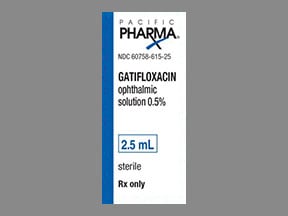
Gatifloxacin Coupons & Savings Card – Discount Prices from $26.31
Generic for: Zymaxid
Gatifloxacin (Zymaxid) is an antibiotic eye drop belonging to the fluoroquinolone class, specifically designed to treat bacterial eye infections like conjunctivitis, commonly known as pink eye. It is effective against infections caused by certain bacteria, but it does not work for viral forms of conjunctivitis. Suitable for use in individuals aged one year and older, this medication is typically administered multiple times a day over a course of about a week. Gatifloxacin functions by inhibiting bacterial proteins necessary for their growth and repair, thereby eliminating the infection. Common side effects may include eye irritation and a change in taste. It is important to use this antibiotic only as prescribed to prevent reduced effectiveness. Always consult a healthcare professional before starting any medication regimen.
Our coupons are free to use. Before paying, show the pharmacist your Gatifloxacin savings card to get your free discount. Use our filters below to edit the prescription box to match your needs. The Gatifloxacin prices will update based on your prescription needs. Above our Gatifloxacin coupons, you can change your location to see pharmacy prices and costs in other areas. We're here to help you buy Gatifloxacin at the lowest price with our prescription discount card.
My prescription
Edit
2.5ML of 0.5%, Gatifloxacin (1 Bottle)
Select pharmacy

CVS
$26.31
COUPON PRICE
Walmart
$31.71
COUPON PRICE
Walgreens
$37.75
COUPON PRICE
Albertsons
$40.58
COUPON PRICEGatifloxacin savings card
Show this card to your pharmacist
CVS
$26.31
BIN
ID
PCN
GRP
019876
LH4B61CDA1
CHIPPO
LHX
Powered by
Gatifloxacin (Zymaxid) is an antibiotic eye drop belonging to the fluoroquinolone class, specifically designed to treat bacterial eye infections like conjunctivitis, commonly known as pink eye. It is effective against infections caused by certain bacteria, but it does not work for viral forms of conjunctivitis. Suitable for use in individuals aged one year and older, this medication is typically administered multiple times a day over a course of about a week. Gatifloxacin functions by inhibiting bacterial proteins necessary for their growth and repair, thereby eliminating the infection. Common side effects may include eye irritation and a change in taste. It is important to use this antibiotic only as prescribed to prevent reduced effectiveness. Always consult a healthcare professional before starting any medication regimen.
Our coupons are free to use. Before paying, show the pharmacist your Gatifloxacin savings card to get your free discount. Use our filters below to edit the prescription box to match your needs. The Gatifloxacin prices will update based on your prescription needs. Above our Gatifloxacin coupons, you can change your location to see pharmacy prices and costs in other areas. We're here to help you buy Gatifloxacin at the lowest price with our prescription discount card.
More prescriptions for eye infection
coupons from$29.93Save 86%
coupons from$40.30Save 85%
coupons from$8.22Save 85%
coupons from$58.05Save 81%
coupons from$10.14Save 77%
coupons from$1.01Save 99%
coupons from$10.14Save 77%
coupons from$27.16Save 96%
More prescriptions for eye infection
Bethkis Save 86%coupons from $29.93
Ovace Wash Save 85%coupons from $40.30
Sulfacetamide-prednisolone Save 85%coupons from $8.22
Lotemax Save 81%coupons from $58.05
Moxifloxacin Save 77%coupons from $10.14
Sodium Sulfacetamide Wash Save 99%coupons from $1.01
Vigamox Save 77%coupons from $10.14
Acticlate Save 96%coupons from $27.16
Gatifloxacin dosage forms
Use our Gatifloxacin 1GM coupon with prices from $1.01 for 1 Bottle. You can also use our Gatifloxacin 1GM coupon with prices from $1.01 for 2 Bottles. We have a Gatifloxacin 1GM coupon with prices from $1.01 for 3 Bottles. You can use our Gatifloxacin 2.5ML of 0.5% coupon with prices from $26.31 for 1 Bottle.
Dosage Quantity Price from Per unit 1GM 1 Bottle $1.01 $1.01 1GM 2 Bottles $1.01 $0.51 1GM 3 Bottles $1.01 $0.34 2.5ML of 0.5% 1 Bottle $26.31 $26.31 2.5ML of 0.5% 2 Bottles $34.33 $17.16 2.5ML of 0.5% 3 Bottles $42.34 $14.11
| Dosage | Quantity | Price from | Per unit |
|---|---|---|---|
| 1GM | 1 Bottle | $1.01 | $1.01 |
| 1GM | 2 Bottles | $1.01 | $0.51 |
| 1GM | 3 Bottles | $1.01 | $0.34 |
| 2.5ML of 0.5% | 1 Bottle | $26.31 | $26.31 |
| 2.5ML of 0.5% | 2 Bottles | $34.33 | $17.16 |
| 2.5ML of 0.5% | 3 Bottles | $42.34 | $14.11 |
